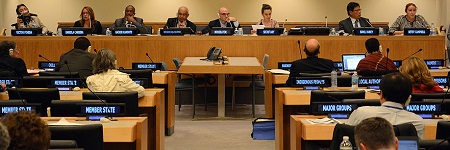Right to the City is widely supported in the open-ended informal Habitat III consultations at UN Headquarters
Last week in New York, proponents advocated the adoption of the Right to the City in New Habitat Agenda in all informal hearings that the UN conducted in preparation for Habitat III (United Nations Conference on Housing and Sustainable Urban Development).
A round of informal intergovernmental negotiations on the New Urban Agenda began on 8 June, gathering representatives of most UN Member states present, with Mexico and Philippines as co-facilitating. The subject of the negotiations was the current Zero Draft of the outcome document for the coming summit in October 2016.
Nelson Saule of PÓLIS Institute (Brazil) represented Habitat International Coalition (HIC) at the event. He reported that the Brazilian government issued a statement in defense of the Right to the City. The trend among the G77 countries is to keep the draft’s paragraph 4 in the Quito Declaration: “We commit to the realization of the concept of cities for all, which in some countries is defined as Right to the City.”
Brazilian civil society released a letter reviewing the draft document, correcting the mistaken association of the Right to the City as synonymous with “city for all.” The letter points out that “the concept of ‘city for all’ emerged only recently and is primarily related to the dimension of equality and non-discrimination in the cities; while the concept of right to the city has been built over several decades from a grassroots movement, and reaffirms the sense of the city as a common good.”
A massive campaign on Twitter and Facebook networks, mobilized by civil society on 6–7 June advocated the inclusion of the Right to the City in the New Urban Agenda.
According to Saule, few national government representatives participated in the informal hearings, which is an indicator of the difficulty of civil society and local governments to be heard by national and international levels.
Since the beginning of the Habitat III process, civil society actors have asserted their role in the drafting of the New Agenda. Already at the Civil Society Roundtable in the 7th World Urban Forum (Medellín, April 2014), Habitat International Coalition President Lorena Zárate expressed HIC’s three basic demands for Habitat III:
1. Integrity of the Habitat Agenda, not reducing it to merely an “urban agenda”;
2. Maintaining the core Habitat II human rights commitments, in particular states’ obligation to the full and progressive realization of the human right to adequate housing”;
3. Participation criteria and modalities equal to, or more inclusive than those at Habitat II.
For the New Habitat Agenda to be relevant, the widest possible participation is indispensable, including the participation of state delegations in the debate with multiple stakeholders, not least civil society and local governments.
See a report of the informal consultation
Photo: Panel on Vision-Quito Declaration (L-R): Victor Pineda, World Enabled, US; Daniela Carrera Marquis, Inter-American Development Bank (IDB); Bachir Kanoute, Executive Director, Enda ECOPOP, Senegal; Habitat III Deputy Secretary-General Kumaresh Misra; Moderator Christopher Dekki, Pax Romana, US; Rachel Stein-Holmes, Secretary to Habitat III; Nicholas You, Citiscope, on behalf of Metropolis; and Betsy Campbell, European Foundation Center, US. Source: IISD.














